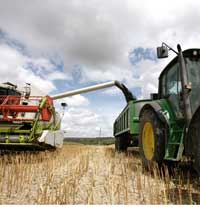Don’t overlook the value of rape straw this season, growers told

Arable farmers should consider baling oilseed rape straw this harvest as livestock producers seek supplies of forage to make up for poor silage yields.
“We have been baling and selling rape straw for a number of years and those farmers who use it are surprised at how much their stock like it,” said Yorkshire straw merchant Andrew Holman.
Like most straws, rape straw is better the drier it is, he adds, but it is easier to bale and store than many growers might think.
Rape straw might provide a valuable extra income to growers as well as help livestock producers meet their forage needs. Mr Holman says good rape straw trades at a discount of between £5 and £8/t on wheat straw, with lesser-quality material trading at least a £10/t discount. Early harvest 2010 wheat straw has been trading up to £70/t, traders say.
With approximately only half of the UK’s cereal straw baled every year, Mr Holman says there is great potential for cereal growers to make more revenue from straws of all types.
Like other straws, rape straw can play a significant role in ruminant nutrition, according to Jennifer Picken, ruminant nutritionist at Keenan Systems.
“Rape straw provides a valuable source of fibre, helping to maximise the nutritional value of silage,” she says. “Although it is very important that it is mixed well to ensure good intake.”
She advises oilseed rape growers who are considering baling their straw to avoid it being too stemmy and to prevent contamination with soil. The straw should also be as dry as possible to avoid the growth of mould. Rape straw that has been harvested by a conventional walker combine rather than a rotary is also better in a livestock ration.

